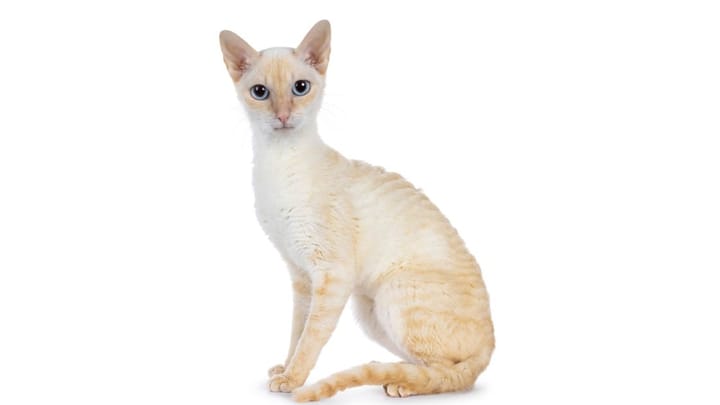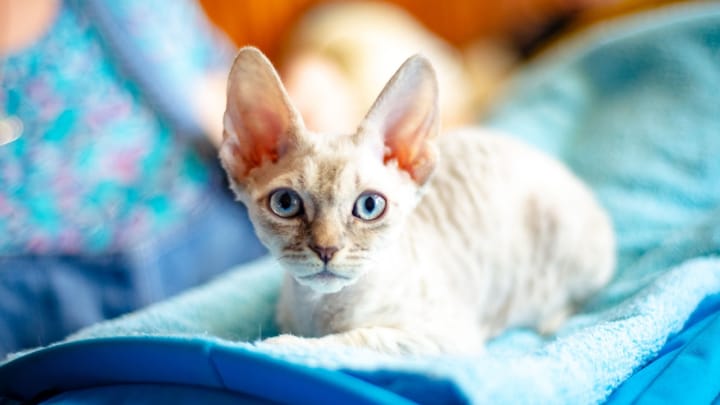German Rex


What can we say about this cat’s unique appearance? Their woolly fur makes them look like a lamb. Like the Laperm breed, the German Rex is the result of a genetic mutation. They are, as their name indicates, part of the Rex family and it’s difficult for the untrained eye to differentiate them from the Cornish, Devon or Laperm because of the great similarity between these varieties. The main differences are in the guard coat and the down coat. GCCF compares the morphology of the German Rex with that of the European Shorthair. In short, these cats are truly beautiful and even though they are rare, they will no doubt grow to be well-known eventually.
|
Life expectancy |
The German Rex has a life expectancy of between 9 and 14 years |
|
Temperament |
|
|
Adult size |
Female
Between 12 and 14 in
Male
Between 12 and 14 in
|
|
Adult weight |
Female
Between 9 and 13 lb
Male
Between 9 and 15 lb
|
|
Coat colour
All colors are recognised (in all types and all divisions except amber), except those with a chocolate, lilac, cinnamon or fawn base. |
Black White Red Cream |
|
Type of coat
Short, wavy and thick |
Short |
|
Eye colour
Golden yellow, green, orange |
Green
Yellow
|
These types of Rex are lesser known than the Cornish and the Devon, but they are nonetheless an official breed recognised the FIFE. They are considered, according to some sources, as very rare but certain breeders are working very hard on developing the breed so that it gains in popularity. In some countries (Russia and Finland, for example), crosses with smooth-haired cats are made to avoid too much consanguinity.
More details about the German Rex
German Rex: Origins and history
Some people believe that the German Rex is the first curly-haired cat breed to exist. The first specimen was found by Erna Schneider in Kaliningrad (formerly Kõnigsberg) in 1930 and was called Kater Munk. Then, in Pankow (formerly Buch) in 1946 or 1951 (there are contradictions between sources), a small black and white cat with curly fur, whose name was Lämmchen, was found by Dr. Rose Scheuer-Karpin in the garden of a hospital where she worked. In short, what we know for sure is that the breed comes from Germany. Lämmchen gave birth to several kittens and the German Rex breed was introduced to the world!
Physical characteristics of the German Rex
Their size, which is about average, is similar to that of all other Rex cats. They are strong and muscly. And you’ll probably never be able to stop stroking their fluffy fur.
German Rex: Characteristics
German Rex: Behaviour
Breed compatibility German Rex
German Rex: Purchase price
We do not have enough data to set an average price for a German Rex, however the price will vary according to the lineage, breeding, age or even the sex. For your monthly budget you should allow on average £35 per month to meet their needs, offering them a high-quality diet and ensuring you keep them healthy.
German Rex: Shedding
Light
Hair loss is extremely minimal among this breed.
German Rex: Grooming
A weekly brush is easily enough for these cats. You should also take particular care of their ear hygiene as, like other Rexes, they can produce a fair amount of secretions.
German Rex: Health
This cats tend to live for between 9 and 14 years.
They have very little resistance to cold temperatures, since their fur isn’t adapted to stand up to it.
They sometimes have a tendency to put on unnecessary weight as they need to consume slightly more calories than most cats in order to maintain their body temperature. You should keep an eye on the portion sizes you serve them.
As the German Rex is still rare and little-known, no sources yet mention any diseases to which they have a particular predisposition.
They may nonetheless suffer from the same conditions as other cats, such as oral diseases.
Pairings with the European Shorthair are recognised.


